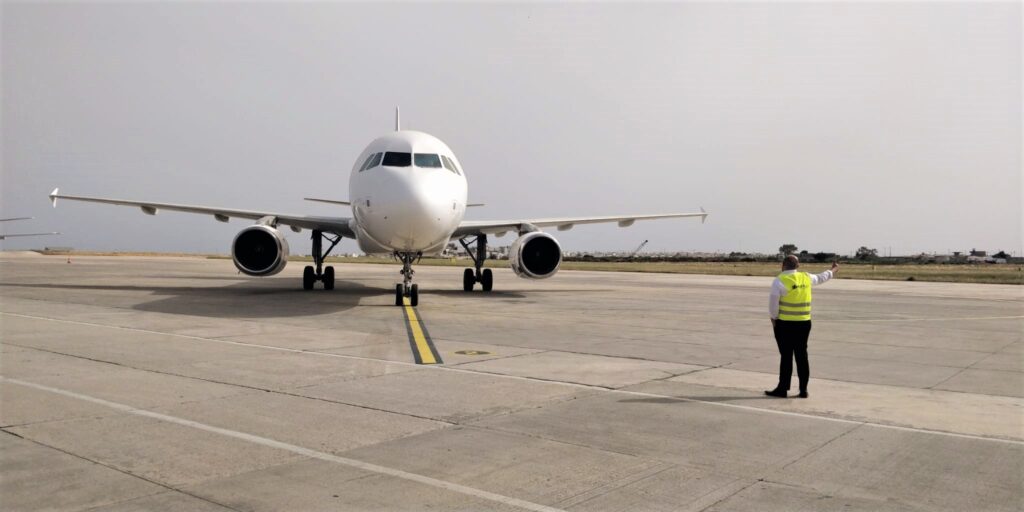BEGINS
2022: Malta is bucking the trend with strong recovery, growth and optimism against the backdrop of a dramatically shifting and increasingly uncertain world.
2022 has seen a resurgence in the aviation industry, whether it be private, commercial, business or pleasure, passenger numbers are up, and some semblance of normality has returned to the sector. I use the term “normality” lightly as no sooner had recovery begun to take hold, than the industry was hit with the Russian invasion of Ukraine and the fallout of increased energy costs. This is combined with the recent OPEC+ announcement of a cap on oil production output, intending to drive fuel prices up, which will hit the aviation industry hard.
Michael O’Leary, the CEO of Ryanair himself stated that the “era of low fares is over” and will stop offering low-cost flights over the next several years. O’Leary expects the carrier’s average fare to rise to about 50 euros over the next five years from around 40 euros in 2021.
O’Leary told the BBC that “There’s no doubt that at the lower end of the marketplace, our really cheap promotional fares — the one-euro fares, the 0.99 euro fares, even the 9.99 euro fares — I think you will not see those fares for the next number of years.”
But there has been plenty of good news this year, with the general mood across the Maltese aviation sector being one of optimism and real growth. Passenger numbers are nearing pre-pandemic levels and the Maltese aviation register is set for exponential increases in 2023.
Ever-growing and ever-evolving: Great news for Malta’s 9H- aircraft register.
Malta is 27 km long and 14.5 km wide and is about five times smaller than London. Yet, it has one of the fastest-growing aircraft registries in the world. Transport Minister Aaron Farrugia said there will be some 800 aircraft on the Malta Aviation Register by 2023.
According to a JETNET study carried out in 2020, the Maltese aircraft register has secured a phenomenal 297% increase in registrations from 2009 to 2019 in business jets and turboprops alone.
And this figure doesn’t even include large-scale registrations by Ryanair and Wizz Air. Ryanair and its subsidiary, Malta Air, currently have 149 aircraft registered. Eurowings have just registered 20 of its aircraft in Malta. Wizz Air, which has just gained its Maltese AOC, is planning to register 78 aircraft on the 9H- register by the summer of 2023.
Eurowings comes to Malta.
Lufthansa subsidiary, Eurowings, which has a fleet size of 107 and serves 130 destinations, have chosen Malta as an operational base, relocating its HQ from Austria to Malta. It has received its Maltese AOC and will register 20 of its aircraft on the 9H- register, starting its first flight on 3rd November.
Eurowings Managing Director, Stefan Beveridge, “Eurowings Europe is an essential part of Eurowings. We have 20 aircraft that we operate at the moment with bases all the way from Stockholm in Sweden down to Palma in Spain, and the plan is to transfer these 20 aircraft into the new company. The 20 aircraft will continue to operate from their present bases, and we would like to continue to grow as a company outside the German home market.”
Captain Charles Pace, Director of Malta’s Civil Aviation Directorate said that “Many of these companies see this [a move to Malta] as something positive, they find we are available, easier than other countries, they tell us that it is difficult to speak with an authority in other places as it is farther away than Malta.”
Wizz Air Malta becomes a reality.
Wizz Air Malta made its maiden voyage from Malta Luqa airport to Rome Fiumicino on the 27th of September 2022 following the airline being granted its Maltese AOC. Wizz Air has appointed Diarmuid Ó Conghaile as the Managing Director of Wizz Air Malta, who will be based at their new offices in Valetta from the 1st of November 2022.
Wizz Air also plans to place up to 78 aircraft with its new Maltese company by the summer of 2023. Dr Aaron Farrugia, Malta’s Minister for Transport, Infrastructure and Capital Projects, stated “We are expecting this airline will register a substantial amount of aircraft in our country, further increasing the number of our already strong 9H fleet. Malta will continue to support investors who choose Malta as their jurisdiction for the benefit of this very important industry, and ultimately for the strength of our economy.”
Transport Malta’s CEO, Brig. Jeffrey Curmi said “Companies like Wizz Air will be establishing a Business Center in Malta. This will offer new job opportunities for Maltese and Gozitans and will aid in increasing the network of trips to and from our country” said Curmi.
Wizz Air President, Robert Carey, said “We are pleased to announce the establishment of Wizz Air Malta, which will provide opportunities to further diversify our operations and drive growth. Malta’s economic and regulatory regime will enable Wizz Air to strengthen its position in the global market. We would like to thank EASA and TM CAD for their support and expertise, and we look forward to working with the Maltese authorities over the coming years.”
Up and Away! A huge increase in passenger numbers at Malta Airport.
Summer 2022 saw rises in passenger numbers into Malta International airport approached pre-COVID levels with 2.66 million passengers travelling through the airport over the 2022 summer season. Malta airport’s seat load factor (SLF) stood at 89.5 per cent, marking a 3.3 per cent increase over 2019 with an 86% recovery in pre-pandemic passenger levels.
Italy had the largest number of passengers with 13.1% of all passenger numbers, pushing the UK down to the second spot, which generated 33 % less traffic than it had in 2019, and could be interpreted as a knock-on effect of Brexit. Germany took the third spot once again and the French took the fourth spot, but interestingly with a 29.5% increase in traffic when compared to pre-pandemic levels.
Present and future challenges for Malta and the aviation industry in general.
As sanctions against Russia bite, the country has had to dismantle its aircraft to maintain other commercial aircraft still operating. On August the 8th, a Reuters report stated that Russian airlines, including Aeroflot, are taking parts from their fleet to ensure they have an inventory of spare parts as they can no longer buy abroad because of Western sanctions. The global impact of the war in Ukraine from a humanitarian standpoint has been catastrophic and the impact on the impact on the aviation industry pales into insignificance on the basis of this.
However, Ukrainian airspace remains closed, and according to a recent IATA report, this has affected roughly 3.3% of total air passenger traffic in Europe, and 0.8% of total traffic globally (2021). In 2021, international air traffic to and from Russia accounted for 5.7% of total European traffic.
In an industry recovering from the impact of the pandemic and a Maltese aviation sector that has had to navigate the fallout from Brexit, it now has to deal with the challenges of rising fuel prices and populations across Europe dealing with a cost-of-living crisis that is unprecedented in our times. This is combined with market uncertainty and volatility as well as the ever-shifting alliances and powerplays with the OPEC+ recent announcement to reduce oil output to drive further fuel price increases.
In 2022, with its European populations making choices of whether to “heat or eat”, it’s difficult to see where air travel fits into this set of considerations. Yes, people want to fly, they need to fly, but will they in such numbers in 2023 as the war grinds on? But Aviation Malta magazine believe that as geopolitics plays out on the world stage, our industry will continue and will rise to the challenge as it did with COVID.
Aviation Malta has spoken to many of the 2022 issue contributors about this and our team has seen nothing but innovation and determination from these Maltese-based companies. Whether they are world-class MROs, regional airlines, global private jet operators or Transport Malta itself, they have not just soldered on, but they have restructured, consolidated and have come through the other side bigger, bolder and better organisations. Today, these Maltese-based companies are more confident, match-fit and ready to take whatever the latest challenge throws at them.
To these companies and the Maltese aviation sector in general, Aviation Malta magazine salutes you!
ENDS (1406).
Andrew
Shameen
Editor at Aviation Malta




